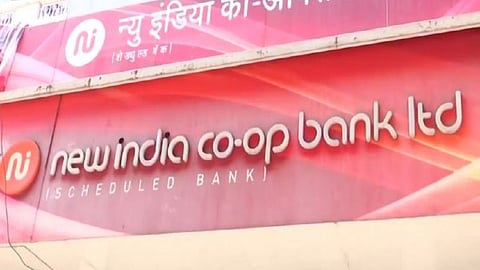

MUMBAI: The economic offences wing of the Mumbai Police have registered a case against Hitesh Praveenchand Mehta, a former general manager and head of accounts with the now crippled New India Cooperative Bank, which was placed under an administrator by the Reserve Bank for governance failures and misappropriation of public funds from Friday, for allegedly siphoning off Rs 122 crore from its treasury.
According to a PTI report Saturday, the FIR has been registered at the Dadar Police station in central Mumbai, which states that the accused Mehta and his associates embezzled Rs 122 crore, which customers had kept in the bank's Prabhadevi and Goregaon branches. Later, the Dadar police have transferred the case to the economic offences wing, which is now investigating the matter.
The FIR is registered under sections 316(5) (criminal breach of trust by a banker) and 61(2) (criminal conspiracy) of the new criminal laws under the Bharatiya Nyaya Sanhita.
Mehta, who oversaw the Dadar and Goregaon branches, is accused of misusing his position to commit fraud between 2020 and 2025.
The case against Hitesh Mehta was lodged on a complaint by Devarshi Shishir Kumar Ghosh, the bank’s now sacked chief executive officer, at the Dadar Police Station, according to the PTI report. Ganesh Gawde, deputy commissioner of police Zone 5, said the case has been transferred to the economic offences wing for further investigation.
On Friday, thousands of panic-stricken depositors had queued up before the branches of the bank seeking to know if their money was safe and could be withdrawn.
The RBI’s restrictions prevent the bank from issuing new loans, making investments, borrowing funds or allowing withdrawals for six months due to concerns over its financial stability. The RBI also superseded the bank’s board of directors for 12 months, citing “poor governance standards.”
The RBI has appointed Shreekant, a former chief general manager of the State Bank of India (SBI), as the administrator to manage the bank’s affairs. Additionally, a committee of advisors has been formed to assist him, the RBI said.
The RBI directed the loss-making bank not to grant or renew any loans and advances, make any investment, incur any liability including borrowing funds and acceptance of fresh deposits, disburse or agree to disburse any payment whether in discharge of its liabilities and obligations without prior approval of RBI in writing.
The RBI restrictions came into effect after the close of business on February 13, and will be valid for six months.
New India Cooperative Bank has a network of 30 branches and a deposit base of Rs 2,436 crore as of March 2024. The bank had posted losses of Rs 22.78 crore in 2023-24 and Rs 30.74 crore in 2022-23.
Meanwhile, for the second day on Saturday, branches of cooperative bank with 30 branches across the city, continued to see chaos as customers queued up in large numbers after the central bank barred the bank from allowing depositors from taking out their money.
New India Co-operative Bank has around 1,30,000 depositors with an outstanding balance of Rs 2,436 crore as of March 2024, which rose from Rs 2,406 crore a year back despite it reporting losses for the past two fiscals. In FY24 its losses rose to Rs 33 crore from Rs 22.8 crore in the previous year. Its advances came down to Rs 1,175 crore from Rs 1,330 crore during this period.
While clamping down a six-month ban on cash withdrawals by depositors, the RBI said their money up to Rs 5 lakh are secured as they are insured by the Deposit Insurance and Credit Guarantee Corporation (DICGC) and that these restrictions do not mean the bank’s licence is being cancelled. Sources said as much as 90% of the depositors of the crippled bank are eligible for the guarantee as their deposits are under Rs 5 lakh.
Friday, the Reserve Bank superseded the board of New India Cooperative Bank—the first such instance after the larger PMB Bank, which had over Rs 11,600 crore is September 2019 after it was found that the bank was engaging in fraudulent lending practices as much as 70% of the its Rs 8,380 crore loan book was with one realty firm HDIL which also soon went belly up--for a 12 months. Consequently, the RBI appointed Shreekant, a former chief general manager of State Bank of India as the administrator to manage the affairs of the bank during this period.
The RBI has also appointed a two-member committee of advisors comprising Ravindra Sapra, a former general manager of SBI, and Abhijeet Deshmukh, a chartered accountant, to assist the administrator.
Interestingly, the RBI had barred the bank from giving out new loans and taking new deposits apart from banning its depositors from taking out their money, a day before (February 13) but the communication to this effect was made public only the next day (February 14) when it sacked the board of the bank and placed it under its an administrator.
RBI said these actions were necessitated "due to certain material concerns emanating from poor governance standards observed" in the bank.
Considering the cooperative bank's present liquidity position, the RBI has directed not to allow the withdrawal of any amount from savings bank or current accounts or any other account of a depositor but is allowed to set off loans against deposits subject to RBI conditions.